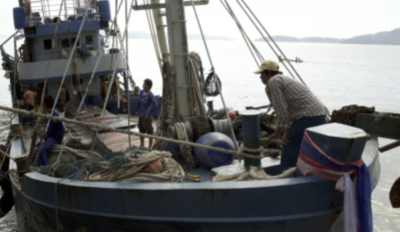
Publication Date:
Migrant fishers in Taiwan’s distant water fishing industry, their unions, and international allies have launched a global solidarity campaign called “Wi-Fi NOW for Fishers’ Rights at Sea,” demanding mandatory access to free Wi-Fi for fishers on board Taiwanese distant water fishing vessels. Wi-Fi access is necessary for fishers to be able to exercise their freedom of association and right to collective bargaining so that they can defend their other fundamental labor rights under international law. Taiwan, the United States, and other key markets, as well as vessel owners, global seafood buyers, and investors, each have a critical role to play in making this happen.
The Wi-Fi NOW for Fishers’ Rights at Sea campaign presents this second briefing paper, Wi-Fi: Available at Sea — but Not for Fishers, to answer Frequently Asked Questions (FAQs) about the current availability of Wi-Fi on distant water fishing vessels. In an industry made possible by advanced technology, satellite Wi-Fi has become widely available on distant water fishing vessels at a reasonable cost. This briefing paper shows that installing Wi-Fi equipment on board vessels is only a minute fraction of the cost of constructing a distant water fishing vessel, and its monthly costs are but a small fraction of existing labor costs. Moreover, the technology is only becoming increasingly advanced and affordable.
In fact, Wi-Fi is already available at sea, not only for seafarers outside the fishing sector but also for captains and senior crew on many Taiwanese distant water fishing vessels — yet fishers remain excluded. Employers in Taiwan’s distant water fishing industry continue to deny fishers access to Wi-Fi, creating conditions of total isolation for their workforce for months at a time, in violation of the International Labour Organization (ILO) Work in Fishing Convention, 2007 (No. 188) (C188) and fundamental labor standards.
Fishers are being excluded from a technology that is essential for their fundamental labor rights at work. With Wi-Fi becoming ever more available even thousands of miles at sea, now is the time to ensure its expansion in Taiwan’s distant water fishing fleet, including for the fishers whose labor makes the industry possible.
Below are some key points highlighted in this briefing paper:
- Since its inception, technological advancements have continued to develop and proliferate in the distant water fishing industry for commercial, safety, and monitoring purposes, but not for fishers’ well-being and respect of their fundamental labor rights under international law.
- Many companies already offer satellite Wi-Fi services that can be used at sea, and many ships and fishing vessels are already equipped with satellite Wi-Fi.
- Migrant fishers working on Taiwanese distant water fishing vessels generally do not have access to Wi-Fi on board vessels even if captains or officers do.
- The cost of satellite Wi-Fi services on vessels is already relatively affordable for the Taiwanese distant water fishing industry, and the technology is only becoming increasingly more advanced and affordable.
- If the Taiwanese government wanted to cover the costs of Wi-Fi, the cost would only be 1.3–2.4% of the total subsidies the government spends on subsidies for the distant water fishing industry.
- The Taiwanese government’s new subsidy program for Wi-Fi on distant water fishing vessels is too limited in scope, as it only requires fishers to have access to Wi-Fi for at least five minutes once a week for six months.
- Providing all fishers with access to Wi-Fi on board would be cheaper than providing each fisher with access to a satellite phone.
Publication Type:
- Report


